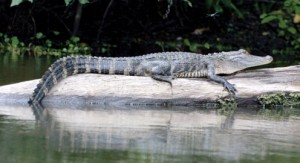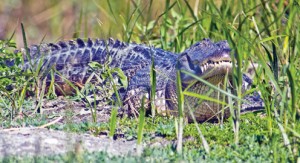By JIM FOSTER
Special to the Parade
 It has not been that long ago when it was difficult to find a pond or lake holding water in most of our area. The drought had a grip on South Texas and other parts of the country. Today, the story is a bit different with many places in the county receiving much needed rain.
It has not been that long ago when it was difficult to find a pond or lake holding water in most of our area. The drought had a grip on South Texas and other parts of the country. Today, the story is a bit different with many places in the county receiving much needed rain.
One of the creatures enjoying some wet weather is the American alligator. The alligator in Texas has made a great recovery and have increased their range through movement during dry years, when alligators go looking for fresh water due to their ponds beginning to dry up. Their home waters can include resacas, farm ponds, lakes, and rivers on refuges as well as on private lands.
 The status of the alligator in Texas was reclassified from endangered to threatened by the U.S. Fish and Wildlife Service on Nov. 14, 1983. This change opened the doors to hunting and alligator farming. Alligators do not adhere to boundaries of parks and wildlife management areas and can present a nuisance as well. Urban sprawl has increased the likelihood of alligators showing up where they are unwelcome guests.
The status of the alligator in Texas was reclassified from endangered to threatened by the U.S. Fish and Wildlife Service on Nov. 14, 1983. This change opened the doors to hunting and alligator farming. Alligators do not adhere to boundaries of parks and wildlife management areas and can present a nuisance as well. Urban sprawl has increased the likelihood of alligators showing up where they are unwelcome guests.
The big problem with alligators sharing living space with humans is that a dog or a small child kneeling down at the water’s edge could become the prey of a large adult gator. Gators have also learned human’s pets, both dogs and cats, are high on the alligator menu.
Alligators prey on mammals, such as raccoons, when these animals swim out to feed on birds and eggs at bird rookeries. In this manner, they benefit the bird populations even though they are seen cruising below the nests waiting for a clumsy chick to fall out of a nest. But, many times people will increase their chances of having an encounter with an alligator by attracting them by feeding thereby losing their fear of humans and associate them with food.
I am not sure I agree with those who believe that years of alligator hunting could have a role in the expanding conflicts between people and alligators. Alligator hunters in most cases are hunting the biggest gator they can find. After many years of hunting, only a few of the larger alligators may have been killed. However, there is always another one to take its place.
Alligators grow very slowly. In Texas, it takes 15 years or more for an alligator to reach 10 feet. The theory is that those large alligators are a major factor in keeping the gator population in balance. Big alligators eat smaller alligators, true. Once an alligator grows past two feet in length, a bigger alligator is the only predator that will bother him.
Without the big gators to predicate on the smaller ones, the alligator community made up of smaller four to six foot gators. In many areas this size range is the majority of the population.
However, people-gator contact is increasing, and many times people feeding these “cute scaly critters” is the problem.
At its public meeting the final week of August, the Texas Parks and Wildlife Commission adopted regulations making it a Class C misdemeanor, punishable by a fine of as much as $500, to “intentionally feed a free-ranging alligator.” There is an exception for hunting – for more information and regulations, look on page 66 of the Texas Outdoor Annual Texas alligator hunting seasons. This season (2011-2012) will be September 10-30 in 22 counties and April 1 through June 30 for the rest of the state.
A Texas Parks and Wildlife Department news release earlier this year pegged the alligator population in the three-county area of Jefferson, Liberty and Orange counties at a stunning 286,000 reptiles. And, as anyone who has spent any time in the outdoors in South Texas (BBQ time not counting) knows, we have plenty of alligators.
Editor’s Note: To see more of Jim’s writing and photography go to http://fosteroutdoors.blogspot.com/. If you have comments or news for Jim Foster, email him at jimf06@gmail.com.



Comments